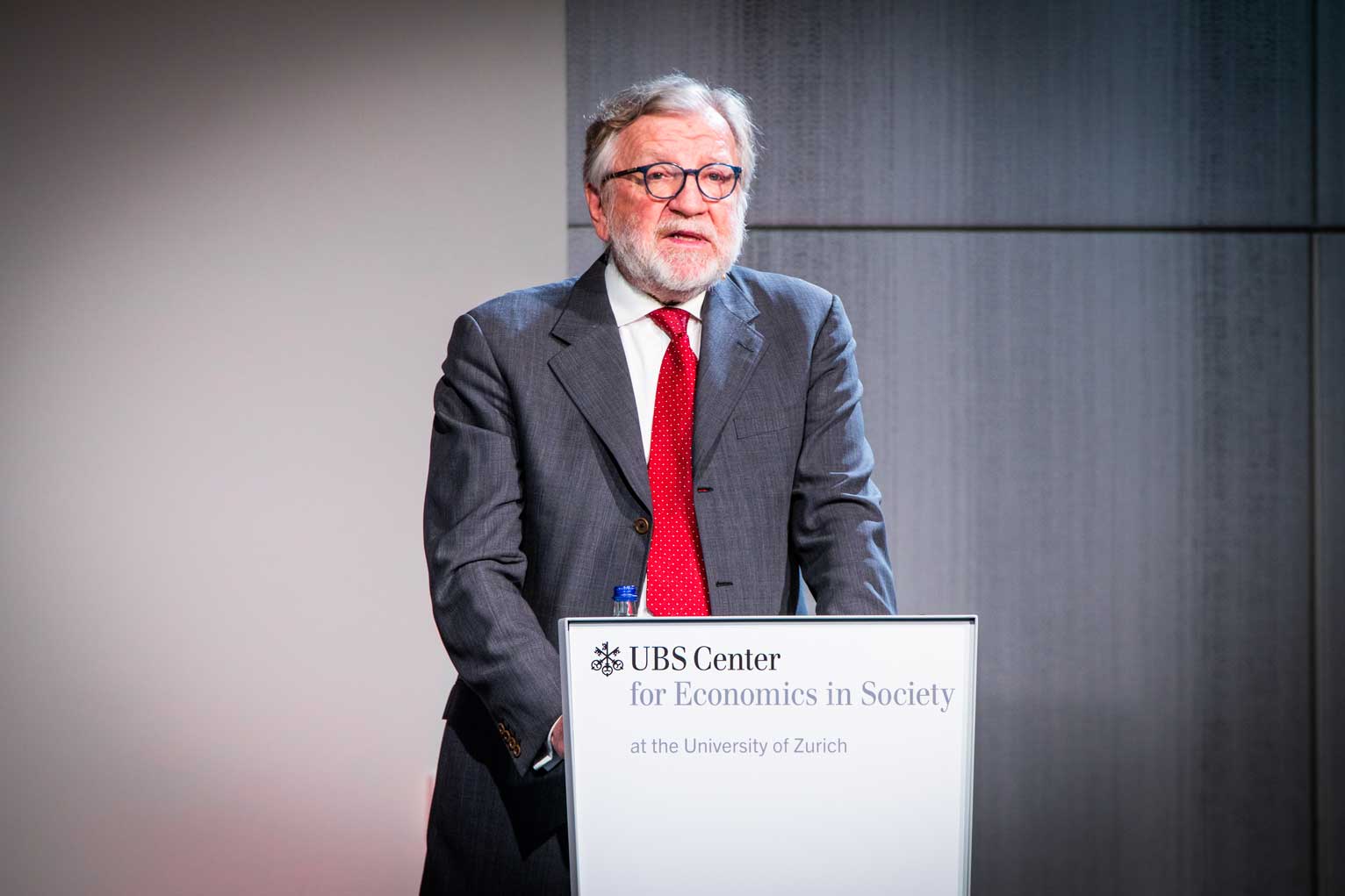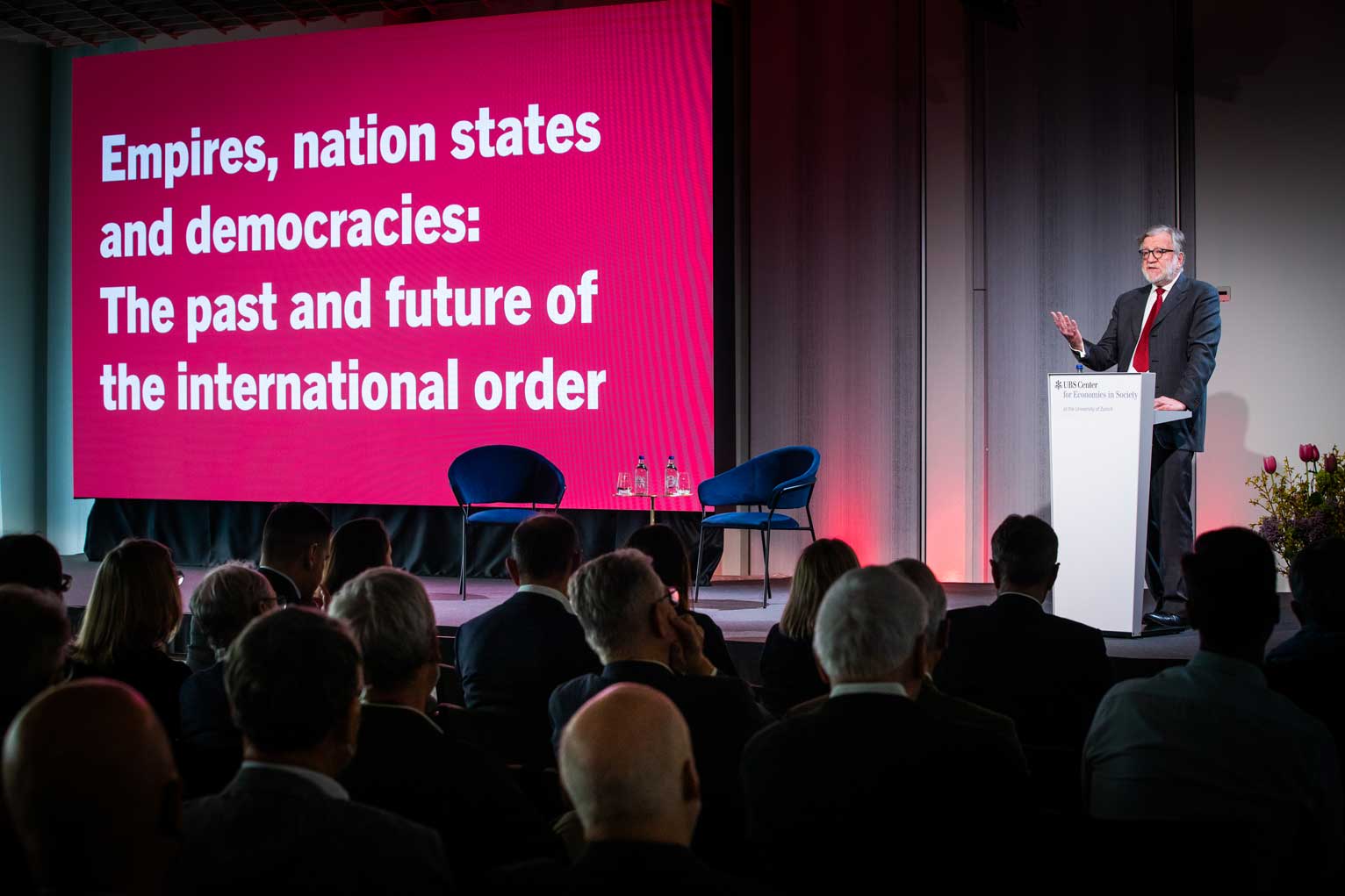This war is the beginning of the end
It would be good if empires like Russia and China were to break up, says Gérard Roland of the University of California at Berkeley. He is convinced that the world is developing in the direction of small democracies that enter into military alliances with each other.
This interview by Christoph Eisenring and Thomas Fuster was originally published in German by Swiss daily «Neue Zürcher Zeitung», 17 April 2022. Translated and edited for layout purposes by the UBS Center.
Mr. Roland, are we witnessing a resurgence of the Russian empire or its last stand before its collapse?
It is both. President Putin has never made a secret of Russia's imperial aspirations. And he has called the collapse of the Soviet Union the greatest catastrophe of the 20th century. At the same time, this war marks the beginning of the end. Even if Russia were able to occupy Ukraine, it would not be able to hold the country.
And what does this mean for Russia?
A power vacuum might result due to its military failures. This might encourage secessionist tendencies. Russia has numerous territories, such as Yakutia, Karelia, Komi, or Buryatia that could strive for independence.
At the beginning of the war, there were fears that other autocracies would also strike, notably China with respect to Taiwan. Has that become more likely?
China has seen that the USA does not intervene directly, but the Ukrainian resistance has been enormous, and a similar resistance would also be expected from democratic Taiwan. Moreover, China would have to launch an attack over the sea, which is much more difficult than over land. An attack has therefore become less likely.
Before the First World War, there were several empires such as the Ottoman, the British, the Austro-Hungarian, or the Tsarist. Is the time of empires over?
The gains for empires are not what they used to be. In the past, the main goal was to conquer land or slaves.
Why should the possession of land not still entice?
In today's world, human capital is the key factor for growth, along with the rule of law. It is easy to supervise workers on a plantation, but you cannot force the well-educated to be productive.
Which of the two remaining empires, China or Russia, is the greater threat to the free world?
Russia is currently militarily dangerous, but Putin will fail. The Russian economy is doing poorly, and the sanctions are making things worse. China, on the other hand, with the possible exception of Taiwan, is not looking to invade other countries. Instead, China sees itself as a leading nation around which other countries should group like satellites. Those who do not recognize China’s leadership must expect repression, infiltration, or censorship, for example, if China were to prevent critical events abroad.
If you look fifty years into the future, could there be new empires?
An Islamic caliphate, such as that the Islamic State is striving for, will not exist. If any country can be trusted to achieve imperial greatness, it is India. Prime Minister Modi is trying to turn India into a nation-state. This is creating tensions, both within India and with its Muslim-majority neighbors Pakistan and Bangladesh. If India continues to grow strongly, it could become an empire.
Would India be more of a military or an economic empire?
I would guess a military power that could then become dangerous to Pakistan, Nepal, Bhutan, and Myanmar. But we are in the realm of speculation here.
The big question is how we should deal with empires. Is peaceful coexistence possible?
Coexistence is unstable. The big problem is that empires can only be defeated from within. Orchestrating regime change from the outside will not succeed. If you try to do it by sowing chaos, for example, you have to be able to control it, which is very difficult.
For a long time, the West hoped for "change through trade," for the democratization of authoritarian regimes through their integration into the world economy. Were we too naive?
Thirty years after the fall of the Berlin Wall, we know: The introduction of a market economy and capitalism does not produce democracy. Growth and economic liberalization do not necessarily lead to political liberalization. It can also go in the other direction.
Should trade therefore be linked to political prerequisites, such as the rule of law, governance, and human rights?
This is questionable. On the one hand, countries should be able to choose their own institutions. On the other hand, the current crisis shows that care must be taken not to become hostage to autocratic states that use economic interdependence for their own ends. The solution to the dilemma is for countries to diversify their trade relations. I would not advocate linking trade exchange with political conditionalities.
In Switzerland, Chinese companies, including state-owned ones, can take over Swiss companies relatively easily. Does this put us at risk?
When China takes over a company, you know: the Communist Party now also has a say in the management. This company can be used by Beijing for political purposes at some point in the future if tensions arise. This creates dependencies on a country that exerts pressure if it is not politically accommodated. It was therefore right to stop Huawei in the West. If Huawei controls the 5G network, it can also cripple this network in the event of conflict.
Chinese owners usually keep a long leash on Western companies after takeovers. They do not intervene directly in the day-to-day business. It is often said that not much changes.
This is a deceptive notion. In China, there is actually a legal distinction between private and state-owned enterprises. But in fact, the Communist Party is behind both. The Party has the right to control. This does not mean that it automatically exercises control. But it can if it wants to. This is reason enough to be cautious.
The war in Ukraine has brought Western states closer together again. Can this war lead to a "rebirth of freedom," as Francis Fukuyama put it, that is, to a global strengthening of liberal ideas?
Yes, but only if Ukraine wins, which is still unclear. The war is a wake-up call. People realize that there are still states with imperialist ambitions, such as Russia or China. On the positive side, time seems to have run out for right-wing politicians like Matteo Salvini, Jair Bolsonaro, or Nigel Farage, who previously supported Putin.
Hungary's Prime Minister Viktor Orban, on the other hand, has just won an election.
Yes, but that was foreseeable. I have been observing Hungary since the 1990s. Nationalist thinking in the country has always been very strong. However, foreign countries did not perceive this.
Should Europe tighten sanctions and impose an energy embargo to bring Putin to his knees?
Russian colleagues like Sergei Guriev are convinced that if oil and gas imports were stopped, the war could be over in a few months. But countries like Germany fear the consequences because energy imports cannot be replaced in the short term. This is wrong. It would be correct to think that an embargo would weaken the Russian regime financially to such an extent that it would have to end the war.
Many economists predict that Europe would have to reckon with a severe recession in the event of an embargo. Is that the price we have to pay?
The Italian head of government Mario Draghi recently said, "Would we rather have peace or running air conditioners?” He got to the heart of the matter. When we see the price people are paying in Ukraine, it is obvious that our purchasing power will also be affected. But this helps end the war.
You propagate a coexistence of many small democracies as the ideal world order. A utopia?
When states become too big and powerful, the problems begin. They have hegemonic ambitions or play the world policeman. It would therefore be good if empires such as Russia's or China's were to break up and be replaced by small democracies organized in regional unions. This may be a utopia. But I am convinced that small states and the EU point the way to the future. The EU shows how you can be a small state and still cooperate with others.
In your research, however, you also show that small democracies tend to pursue a policy of appeasement toward imperial aggressors in the event of conflict. This appeasement encourages empires to be even more aggressive.
The threat exists. That is why small democracies should enter military alliances with one another, combined with a commitment to mutual defense. One example of this is NATO, but its alliance case has never been tested.
You are confident that democracies will win in the long run. However, we sometimes hear, especially from younger people, that climate protection also requires authoritarian action, because democratic processes take too long.
Even in democracies, the executive can be given special powers in the event of a crisis. Climate change is indeed an existential threat. But repression is not the answer. The last thing we need is eco-fascism. We need multilateral commitments in which the efforts of one country lead to efforts by other countries.
But how stable are democracies? Even in the USA, authoritarian reflexes increased under Donald Trump. How great is the danger that democracies will tip over into authoritarianism under the influence of populist movements?
This danger exists. The most important reason for the rise of populist movements was the financial crisis of 2008, when millions of people in the United States lost their jobs and homes. However, Trump was not able to destroy the democratic system. In my opinion, a good way to counter polarization is decentralization. This applies not only to the United States, but also to Europe, where the power of the EU vis-à-vis its member states is also very limited.
It would be good if empires like Russia and China were to break up, says Gérard Roland of the University of California at Berkeley. He is convinced that the world is developing in the direction of small democracies that enter into military alliances with each other.
This interview by Christoph Eisenring and Thomas Fuster was originally published in German by Swiss daily «Neue Zürcher Zeitung», 17 April 2022. Translated and edited for layout purposes by the UBS Center.
Mr. Roland, are we witnessing a resurgence of the Russian empire or its last stand before its collapse?


Empires, nation states and democracies
Contact
Gérard Roland is the E. Morris Cox Professor of Economics and Professor of Political Science at the University of California, Berkeley. He is the author of more than 100 journal articles, books, and book chapters, and has focused in particular on the impact of culture and political institutions on the prosperity of countries. A native of Belgium, he is intimately familiar with the challenges of small nations and federalism. In his presentation, he will focus on the rise of China and the changing world order. Professor Roland has worked as a consultant for the IMF, the World Bank, the European Bank for Reconstruction and Development, the European Commission and the Inter-American Development Bank.
Gérard Roland is the E. Morris Cox Professor of Economics and Professor of Political Science at the University of California, Berkeley. He is the author of more than 100 journal articles, books, and book chapters, and has focused in particular on the impact of culture and political institutions on the prosperity of countries. A native of Belgium, he is intimately familiar with the challenges of small nations and federalism. In his presentation, he will focus on the rise of China and the changing world order. Professor Roland has worked as a consultant for the IMF, the World Bank, the European Bank for Reconstruction and Development, the European Commission and the Inter-American Development Bank.
